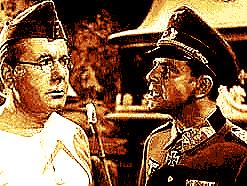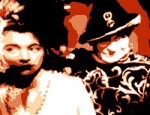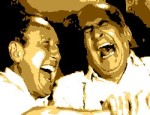Film Review
The Square Peg marks the
absolute highpoint of Norman Wisdom's short but memorable film career,
made at the time when the comedian was at the height of his
popularity. Although extremely successful in their day, Wisdom's
films are generally looked down upon today, owing to their slightly
unpalatable mix of overly boisterous slapstick,
unsophisticated storylines and heinous bouts of saccharine
sentimentality.
The Square Peg
has none of these deficiencies and is consequently one of the few
Norman Wisdom films that have stood the test of time, a film that ought
to be considered a classic of British comedy.
This was the last of six films that Wisdom made with director John Paddy Carstairs,
who fell out with producer Hugh Stewart over the lead actor's ability to
play a dual role.
This is the film in which Edward Chapman first appears as Norman's
suffering sidekick Mr Grimsdale, although the two comic actors had
previously worked together on
Just My Luck (1957).
Honor Blackman gets to play a tough yet glamorous action woman that is
virtually a dry run for Cathie Gale, the mould-breaking character she
would later play in
The Avengers (1962-4).
Watch very closely and you will catch a glimpse of Oliver Reed in one of his
first screen appearances.
And as if that wasn't enough star power to coerce you into watching the
film, the wonderful Hattie Jacques appears as a German opera singer,
stealing the show in the film's most hilarious sequence, where she
attempts a Wagnerian duet with Norman.
The film is significant in that Norman Wisdom gets to play two very
different characters - his familiar gump character, Pitkin, and the
sadistic German officer, Schreiber. The skill with which Wisdom
manages to delineate between these two very different characters is
testament to his talent as a performer and confounded his detractors
who were apt to paint him as a one trick pony. In contrast to
the instantly likeable Pitkin, Schreiber is a chilling portrayal of the
Nazi Übermensch, even when he is spilling
gallons of champagne down Hattie Jacques's cleavage. If there is
one film that Norman Wisdom deserves to be remembered by, that film is
surely
The Square Peg, his
magnificent
pièce de
resistance.
© James Travers 2009
The above content is owned by frenchfilms.org and must not be copied.
Film Synopsis
During WWII, Norman Pitkin believes that he, a humble council employee,
is making an invaluable contribution to the war effort, by digging up
roads. His superior, Mr Grimsdale, agrees and is infuriated when
he learns that Norman's efforts to dig a hole outside an army camp are
being frustrated by the camp's commanding officer. But when Mr
Grimsdale makes his complaint, the camp commander coerces the War
Office into having him and Norman conscripted. Having
completed their basic training, Norman and Mr Grimsdale are parachuted
into France to repair roads. Unfortunately, they find
themselves behind enemy lines and Mr Grimsdale is arrested, mistaken for
the leader of the local French resistance. He is interrogated by
Otto Schreiber, a ruthless Nazi general who bears an almost perfect
resemblance to Norman. In the meantime, Norman meets up with the
real resistance members, one of whom is Lesley Cartland, an attractive
woman officer whom he took a shine to when he began his army training
back in England. When the resistance members are arrested by the
Nazis, Norman digs his way into Schreiber's chateau in an attempt to
rescue them. By impersonating the general, Norman manages to get
his friends to safety, but before he too can escape he is captured and
put before a firing squad...
© James Travers
The above content is owned by frenchfilms.org and must not be copied.



